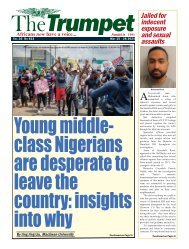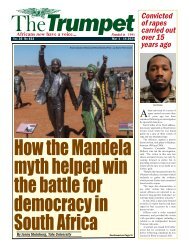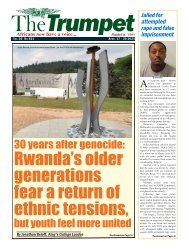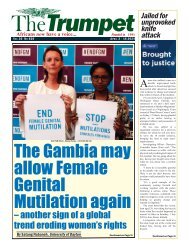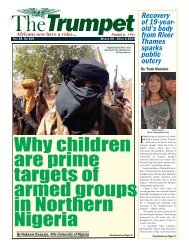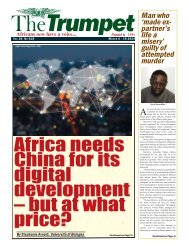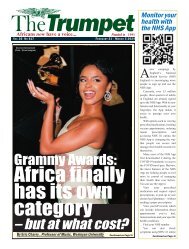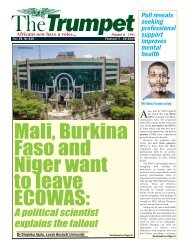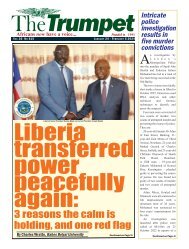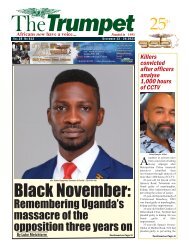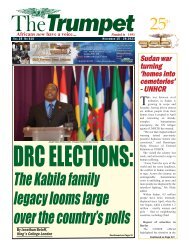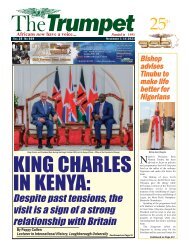The Trumpet Newspaper Issue 549 (July 14 - 27 2021)
Masks still matter
Masks still matter
Create successful ePaper yourself
Turn your PDF publications into a flip-book with our unique Google optimized e-Paper software.
Sport<br />
JULY <strong>14</strong> - <strong>27</strong> <strong>2021</strong><br />
<strong>The</strong><strong>Trumpet</strong><br />
A healthier and more competitive<br />
football for all<br />
Page13<br />
Recently, FIFA President Gianni<br />
Infantino was a special guest of<br />
the second edition of the EFE<br />
Sport Business Forum, broadcast from<br />
Madrid.<br />
In an interview spanning almost an<br />
hour, the President discussed a myriad<br />
of topics. <strong>The</strong> following is an abridged<br />
version of the full interview.<br />
Watching football games these last<br />
few days, football is back at the top of<br />
the entertainment industry, isn’t it?<br />
Yes, definitely. I believe football is<br />
bringing us a lot of excitement these<br />
days, with the [UEFA] EURO and the<br />
[CONMEBOL] Copa América. <strong>The</strong><br />
[CONCACAF] Gold Cup will also take<br />
place soon. Because of the pandemic<br />
there was a moment in which, football<br />
stopped all around the world. This<br />
hadn’t happened since the war and it<br />
was very tough for everyone.<br />
<strong>The</strong>re are many people who have<br />
suffered and who are still suffering, but<br />
the fact that football is back, although<br />
the stadiums are not full yet, gives us the<br />
feeling that we are going back to<br />
normality.<br />
What kind of new things are to be<br />
introduced related to the global<br />
transfer market. What will be the role<br />
of the clearing house that FIFA wants<br />
to create?<br />
If we think of last year before<br />
COVID-19, $7billion was spent in the<br />
international transfer market. Of that<br />
figure, $700 million went directly to<br />
agents and only $70 million went to the<br />
clubs that trained and developed the<br />
players.<br />
Our principle is to reform the<br />
transfer market because we don’t think<br />
that it’s positive to have such a huge<br />
flow of money with almost no rules. A<br />
clearing house will ensure that clubs<br />
training players will be able to receive<br />
the money they are owed, because there<br />
is a solidarity mechanism which<br />
establishes that 5% of the transfer must<br />
be paid to the clubs that provided the<br />
training. This is already in our rules. But<br />
the truth is that only $60 or $70 million<br />
is paid out.<br />
Why? Because these clubs are small<br />
clubs who don’t have the means, who<br />
don’t know they can receive this money.<br />
Who don’t have enough time to ask for<br />
it or can’t pay lawyers to go to court. So,<br />
we want to automate all this to ensure<br />
the process is completely transparent.<br />
FIFPro have requested a fairer<br />
and more reasonable football<br />
calendar. Are so many competitions<br />
really needed? What is the situation<br />
right now regarding the 24-team<br />
FIFA Club World Cup project?<br />
I am convinced this is the opinion of<br />
the vast majority of football<br />
associations, leagues, clubs, fans,<br />
players around the world: we want<br />
football to be healthier, less<br />
discriminatory and more competitive.<br />
To achieve this, we have to look at the<br />
entire international schedule. We have<br />
asked Arsène Wenger, whose football<br />
expertise and professionalism no one<br />
would deny, to take charge of this<br />
process.<br />
In this consultation process we have<br />
undertaken, we started with the key<br />
stakeholders. With players, and<br />
managers, to get to know their opinions<br />
and how they want football to be run in<br />
the coming years.<br />
What do they think about the Club<br />
World Cup? <strong>The</strong> World Cup, the EURO,<br />
the [CONMEBOL] Copa América,<br />
about the [CAF] Africa Cup [of<br />
Nations], the [AFC] Asian Cup? What<br />
are their thoughts on clubs? What do<br />
they think of traveling in September,<br />
October, November, March from one<br />
continent to another? What are their<br />
opinions about playing two matches and<br />
going back or playing four games with<br />
their clubs and then playing again with<br />
their national teams? All of these issues<br />
are very important, and we also want to<br />
hear the fans’ thoughts on them.<br />
Our goal, is to globalise football. We<br />
might ask ourselves whether football is<br />
global or not. Of course, football is the<br />
number one sport in the world, and<br />
football is perhaps global in regards to<br />
passion, emotion and the heart, but it is<br />
absolutely not global in regards to<br />
opportunities to play, the opportunities<br />
to compete, the chances that players<br />
FIFA President Gianni Infantino<br />
have to play at their best in an important<br />
tournament.<br />
My ambition, my dream, our idea,<br />
our philosophy, is to have maybe around<br />
50 clubs from every continent being<br />
able to win a Club World Cup, and to<br />
have around 50 countries, 50 national<br />
teams from every continent being able<br />
to win a World Cup. If we manage to do<br />
this, I think football will be in great<br />
shape.<br />
Let’s talk about women’s football.<br />
What steps are you taking in the short<br />
or medium term to expand, in this<br />
field?<br />
Women’s football is the sport out of<br />
all sports that’s going to see the biggest<br />
growth in the next ten years. I don’t<br />
know where I will be in ten years, but<br />
we’ll talk again, we’ll check the figures,<br />
and we’ll compare women’s football<br />
growth with any other women’s or<br />
men’s sport, and we’ll see the numbers.<br />
I’m not just talking about revenues,<br />
but general figures. <strong>The</strong> last [FIFA]<br />
Women’s World Cup, that took place in<br />
France and was such a huge success,<br />
was seen by 1.2 billion people around<br />
the world. 1.2 billion. More than one<br />
million people in the stands. For the<br />
final alone, we had 263 million viewers.<br />
It’s a sport we have to develop across<br />
the world. That’s why, we at FIFA have<br />
decided to invest $1bn to develop<br />
women’s football, for example, in<br />
projects all around the world, so that<br />
girls can more easily access football in<br />
every country in the world.<br />
I remember the last [FIFA] U-17<br />
Women’s World Cup in Uruguay.<br />
Mexico and Spain contested the final,<br />
and they aren’t countries you’d<br />
historically associate with the<br />
development of women’s football. So,<br />
we have to keep on developing more.<br />
And also, for women’s football, we hold<br />
the same consultation as we do for<br />
men’s football in terms of the<br />
international calendar.<br />
Let’s talk about the World Cup<br />
2030. <strong>The</strong>re are several candidates.<br />
How do you view our Spain-Portugal<br />
bid?<br />
After the FIFA reforms, the FIFA<br />
President doesn’t even have a vote when<br />
it comes to this because it’s the 211<br />
countries who will vote. As President of<br />
FIFA, it’s important to note that once<br />
more there is a renewed interest from a<br />
lot of countries around the world in<br />
becoming candidates. What does that<br />
mean? That means people have faith in<br />
the FIFA process. That may not always<br />
have been the case but it is now because<br />
we have already held votes, for example<br />
for the [FIFA] World Cup 2026 two<br />
years ago, in an open, transparent, and<br />
public process.<br />
<strong>The</strong>re are experts observing the<br />
process, it all gets audited, and the votes<br />
are public and transparent. So, what we<br />
can guarantee Spain and Portugal, what<br />
we can guarantee every country that<br />
wants to host the next World Cup, after<br />
2026 in North America, is that the<br />
process will have total integrity and total<br />
transparency. <strong>The</strong> more candidates there<br />
are, the better it is for the President of<br />
FIFA, or for FIFA. May the best one<br />
win!<br />
We’re in <strong>2021</strong> now. Could you<br />
briefly explain what the next two<br />
years of FIFA will look like?<br />
Our vision is to make football truly<br />
global. If we grow, we can all grow. In<br />
order for football to grow around the<br />
world, we cannot discriminate against<br />
anyone.<br />
Football cannot be reserved for the<br />
few; it has to be open for everyone. And<br />
even the big stakeholders will benefit<br />
from football being open for everyone.<br />
I believe that the gap between the big<br />
and the small is becoming increasingly<br />
wide. Our job must be to globalise<br />
football, starting with young people in<br />
the youth World Cups in development,<br />
to give every talent in the world a<br />
chance, and every boy and girl the<br />
chance to dream.<br />
This is the 2023 vision: to make<br />
football truly global. We have to be<br />
devoted, very open to ideas. We have to<br />
be brave also, because some people<br />
might be scared of change. But, I think<br />
that we have to go with conviction,<br />
positivity; it is necessary to include the<br />
world and make football even more –<br />
much more – global than it is.



